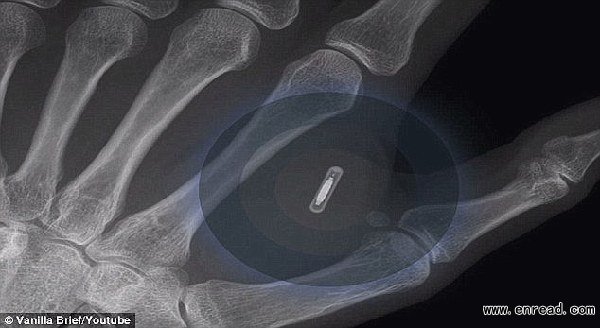| ||||||||||||||||||||||||||||||||||||||||
|
A Swedish company has implanted microchips in its staff which allows them to use the photocopier1, open security doors and even pay for their lunch.
瑞典一家公司将微型芯片植入员工体内。通过这些芯片,员工们可以使用打印机、打开安全门,甚至买午餐。
 Around 700 employees from the Epicenter hi tech office block in Stockholm may eventually have the chips implanted into the back of their hands.
The chips use radio-frequency identification (RFID) and are about the same size as a grain of rice.
They store personal security information which can be transmitted over short distances to special receivers.
RFID chips can already be found in contactless cards - including the Oyster2 system which is used by more than 10 million people to pay for public transport in London.
They are also similar to the chips implanted in pets.
Hannes Sjoblad, the chief disruption officer at the Swedish bio-hacking group BioNyfiken, which implanted the chips into the Epicenter workers, told The Times: 'We already interact with with technology all the time.
'Today it's a bit messy - we need pin codes and passwords - wouldn't it be easy to just touch with your hand?
'We want to be able to understand this technology before big corporates and big government come to us and say everyone should get chipped - the tax authority chip, the Google or Facebook chip.'
He says we will then be able to question the way the technology is implemented3 from a position of much greater knowledge.
He added that they believe they have only just started discovering all of the things having a microchip could allow us to do.
In 1999 Professor Kevin Warwick, of Reading University, had a chip implanted into his nervous system and was able to control a robot arm - developed by his colleague Dr Peter Kyberd - using thought power.
点击  收听单词发音 收听单词发音
|
||||||||||||||||||||||||||||||||||||||||
上一篇:美国公司研发出可消除下巴赘肉的注射药物 下一篇:德国科学团队研究出可自动系鞋带的鞋 |
||||||||||||||||||||||||||||||||||||||||
- 发表评论
-
- 最新评论 进入详细评论页>>



